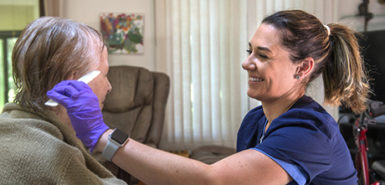
If you have developed swallowing problems as you age, a new study may explain why.
A loss of muscle mass and function in the throat helps explain why 15 percent of seniors have difficulty swallowing (dysphagia), researchers have found.
“Dysphagia has serious consequences for health and quality of life,” said study author Sonja Molfenter. She is an assistant professor of communicative sciences and disorders at New York University in New York City.
Watch for danger signs
Unlike breast or prostate cancers, there’s no across-the-board screening for esophageal cancer, said a doctor of gastroenterology for Spectrum Health Medical Group.
But there are some signs that could signal trouble.
“Barrett’s esophagus is the No. 1 risk factor for developing esophageal cancer,” he said.
Barrett’s is caused by chronic GERD that changes the lining of the esophagus so it resembles intestinal tissue. If you’ve been diagnosed with Barrett’s, continue to see your doctor for careful monitoring, even if your symptoms go away.
Difficult or painful swallowing, also called dysphagia, can signal cancer in the esophagus or the upper gastrointestinal tract. If it’s hard to swallow, call your doctor right away—don’t wait weeks or months to have it checked out.
Other danger signs include pain in the throat or back, behind the breastbone or between the shoulder blades, severe weight loss without trying, and hoarseness or chronic cough.
“This research establishes the need for exercise programs for older adults that target throat muscles, just like those that target the muscles of the arms, legs and other parts of the human body,” Molfenter said in a university news release.
Swallowing problems can also lead to health issues such as malnutrition, dehydration and pneumonia from food and drink that end up in the lungs instead of going down the throat.
Research has also shown that when patients with dysphagia are admitted to the hospital, they’re in the hospital an average of 40 percent longer than those without dysphagia. That adds up to an estimated cost of $547 million a year, the study authors said.
Dysphagia in older adults is concerning as the proportion of seniors in the United States is expected to top 20 percent by 2030, the researchers noted.
The findings were published recently in the journal Dysphagia.
 /a>
/a>
 /a>
/a>
 /a>
/a>